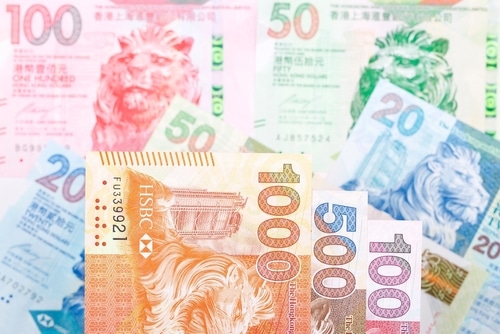The Hong Kong Dollar (HKD) might not make global headlines every day, but it plays a central role in the financial system of one of the world’s most dynamic economies. For travelers, investors, expatriates, and anyone making international transfers, understanding the HKD is essential for navigating monetary exchanges and financial transactions linked to Hong Kong.
This guide covers everything you need to know about the Hong Kong Dollar, from its history and market relevance to why it’s important for the global economy.
What Is the Hong Kong Dollar (HKD)?
The Hong Kong Dollar, abbreviated as HKD and represented by the symbol HK$, is the official currency of Hong Kong. It is issued by three major banks in Hong Kong and is pegged to the US Dollar in a carefully managed system.
For decades, the HKD has been a symbol of financial stability, fueling trade, commerce, and tourism in one of Asia’s leading financial hubs. But what makes this currency unique is its semi-autonomous banking model, reflecting the city’s distinct status as a Special Administrative Region (SAR) of China.
Quick Facts About the Hong Kong Dollar
- ISO Code: HKD
- Symbol: HK$
- Peg: 1 USD = 7.75–7.85 HKD (approximate range)
- Issued by:
-
- HSBC (Hong Kong and Shanghai Banking Corporation)
- Standard Chartered Bank
- Bank of China
Why the Peg to the US Dollar?
To stabilize the value of the currency, the HKD has been pegged to the US Dollar since 1983. The peg is maintained within a range to prevent sudden exchange rate fluctuations, which could affect trade and foreign investment.
This system gives businesses and consumers confidence in their financial transactions, ensuring predictability in an economy heavily reliant on global trade.
Why the Hong Kong Dollar Matters
You might wonder, why should you care about the HKD if you’re not living or working in Hong Kong? The reality is that Hong Kong plays a pivotal role in the global economy, and its currency is integral to this position.
1. A Global Trade Powerhouse
Hong Kong is one of the most active trade ports in the world. Its free port status encourages robust commerce across industries, and the HKD facilitates these exchanges. Even if you’re not directly dealing with HKD, its role in global trade indirectly impacts international prices and shipping networks.
2. A Stepping Stone to the Chinese Market
While the Renminbi (RMB) is China’s official currency, the HKD provides a more familiar middle ground for traders and investors dealing with China. International companies often choose Hong Kong to establish operations before expanding into China’s vast market.
3. Stability Amid Uncertainty
Unlike many emerging market currencies, the HKD remains remarkably stable. Its peg to the USD minimizes volatility, making it a preferred option for businesses managing risks associated with currency fluctuations.
How to Handle the Hong Kong Dollar
Whether you’re visiting Hong Kong, making an international transfer, or investing in the city, it’s essential to manage your HKD transactions efficiently. Below are some practical tips:
1. Currency Exchange Tips for Travelers
If you’re traveling to Hong Kong, exchanging currency can seem daunting. Here are a few tips to ensure you get the most out of your money:
- Avoid airport exchange counters, as their rates tend to be less favorable.
- Opt for reputable currency exchange providers, or withdraw directly from ATMs once you arrive.
- Always check the live exchange rate before converting your money to ensure transparency.
2. Financial Transfers to or from Hong Kong
If you’re an expatriate or a business owner transferring money internationally, using reliable financial services is crucial. Look for platforms that offer:
- Competitive exchange rates
- Low transfer fees
- Secure and fast delivery
- The ability to track your transaction for peace of mind
3. Using HKD for Investments
If you’re investing in Hong Kong real estate, stocks, or bonds, your transactions will likely involve HKD. Be sure to:
- Monitor the HKD closely, as movements within the pegged range could impact investment returns.
- Stay updated on regulatory changes affecting Hong Kong’s financial markets.
Comparing the HKD to Other Currencies
To better understand the HKD’s position globally, here’s a quick breakdown of how it compares to other major currencies:
Hong Kong Dollar vs. US Dollar (USD)
The fixed exchange rate means that the HKD follows the USD more closely than most other currencies. This provides stability, but it also means the HKD is somewhat affected by US monetary policies.
Hong Kong Dollar vs. Chinese Yuan (CNY/RMB)
While the CNY continues to gain influence globally, it is still not fully convertible. The HKD remains a more convenient and liquid currency for international transactions related to Chinese markets.
Hong Kong Dollar vs. Euro (EUR) and Pound Sterling (GBP)
Compared to the EUR and GBP, the HKD provides a greater sense of stability due to its peg to the USD. However, fluctuations in global markets can still impact its perceived value relative to these currencies.
The Future of the Hong Kong Dollar
Despite Hong Kong’s changing political landscape and rising competition from other financial hubs in Asia, the HKD continues to be a trusted and resilient currency. Its role as a bridge between East and West ensures its relevance in global trade and finance, at least for the foreseeable future.
For enterprises and individuals alike, understanding the HKD and its significance is key to navigating both opportunity and risk.
Make Your HKD Experience Smooth
Whether you’re exchanging currencies, making international transfers, or preparing for your next investment in Hong Kong, confidence is critical. Remember to:
- Use a trusted platform for financial transactions.
- Stay updated on exchange rates for smarter decisions.
- Seek expert advice if you’re navigating larger investments or imports/exports.
Planning to send money to or from Hong Kong? Trust in secure and transparent services that make every transfer fast, easy, and reliable. Explore best-in-class solutions with competitive rates today!
